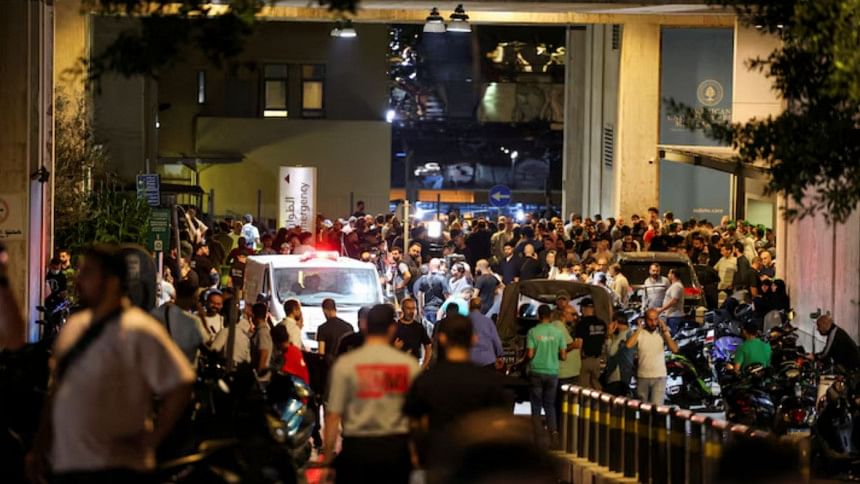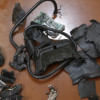Israel's attack in Lebanon: Can it lead to an all-out war?

For months, Israel and Lebanon—particularly Hezbollah, Iran's powerful proxy in the nation—have been engaging in tit-for-tat attacks. At some points, such as when Hezbollah's senior commander Fuad Shukr was killed in Beirut in late July, and Hamas leader Ismail Haniyeh in Tehran around the same time, it seemed as if a shadow war was on the brink of erupting into an expanded conflict. Since Tuesday, that fear is now closer, when hundreds of pagers used by Hezbollah exploded across Lebanon and parts of Syria, killing more than a dozen people and injuring thousands. The next day, more explosions of electronic devices, including walkie talkies, laptops and radios, killed at least 20 people and injured hundreds, according to Al Jazeera. A Hezbollah official has referred to the ominous, action thriller movie-like attack tactics as the "biggest security breach" that the group has faced since Israel launched its military campaign in Gaza post-October 7 attacks, after which cross-border exchanges between Hezbollah and Israeli Defense Forces (IDF) have become near-daily occurrences.
The attacks, where objects used by civilians were rigged, has led experts to interpret a weakness of Hezbollah's defense apparatus to Israeli cyber warriors and Israeli infiltration. Videos have since emerged of Hezbollah fighters blown to the floor by their own communication equipment. It is probable that Israel strategically attacked to disrupt the command centre of Hezbollah. Targeting thousands of people, breaching security, without knowledge of who held the devices or where they were located violates international law, as United Nations human rights chief Volker Turk said on Wednesday, but such is hardly ever a consideration for today's Israel.
Though Israel has not claimed responsibility, it does not simply need to spell it out. Beyond official statements, attacks of such sophistication in Lebanon would only be carried out by Israel's Mossad, to send a tough message to Hezbollah: we can invade your space. It's the kind of political warfare that Netanyahu—who recently faced the largest protests in the history of Israel with his citizens calling for a ceasefire and hostage deal—would wage, to start a wider military war. And to make it more obvious, Netanyahu announced the same day of the attacks, that Israel's war aims have expanded to include displaced Israelis. The statement and decision, also came a day after Israeli Defence Minister Yoav Gallant told the visiting US envoy that "military action" is the "only way left to ensure the return of Israeli northern communities." After almost a year, the northern Israeli residents have been added to an "updated" plan of the war. On Wednesday, Gallant said, "We are at the start of a new phase in the war...the center of gravity is shifting to the north by diverting resources and forces."
First and foremost, the question is why now? Politically, Israel is continuing its operations in Gaza, while its climate in the home front is in ruins—Netanyahu's pressure to resign has been at an all-time high. The current cabinet's relationship with the Biden administration is on eggshells; despite all the pro-Israel rhetoric, Biden said earlier this month that Netanyahu has not done enough to bring the hostages back. On the other hand, the timing of attack could also be that the covert operation needed to happen before Hezbollah or Iran got wind of it. Whatever the reason, these attacks, just a grim three weeks shy of one year of Hamas' attacks and Israel's genocide in Gaza—can have grave implications which will be seen in the days to come.
Hezbollah has now promised to retaliate but this promise now holds more weight as chief Hassan Nasrallah now faces pressure within the group to respond to these attacks. There's an important context to such pressure. Nasrallah and Hezbollah have thrived with an image of invincibility after confronting Israel in 2006, when their commandos launched a cross-border raid on an Israeli armoured patrol, killing two IDF soldiers and taking two hostages. It spiralled into a costly war, especially for Lebanese citizens, 1,200 of whom were approximately killed. More than 100 IDF soldiers were killed, while 43 Israeli civilians died in rocket attacks carried out by Lebanon. Both sides had declared victory, but victory was not defined in the number of killings but rather that Israel failed to achieve its strategic objectives, including retrieving the two hostages alive. Since then, Hezbollah has only been emboldened in the region with its military prowess—with advanced weaponry, more armed personnel, and political legitimacy beyond Lebanon.
The attacks in fact do threaten a wider conflict, and it's the first of covert, sinister rather surprise attacks by Israelis infiltrating Hezbollah. They underscore the capabilities of the Israeli intelligence, and signal further to Hezbollah, that Netanyahu's Israel could also have more sadistic surprises planned. But as coordinated as they may be, Israel knows Hezbollah is, without question, one of the most well-trained and resourced non-state stores in global politics with an arsenal upwards of 150,000 rockets and precision-guided munitions. According to Jordanian Foreign Minister Ayman Safadi, Israel is pushing the entire region towards the abyss of regional war, which would have "drastic ramifications not only for the region, but for the world."
It must also be noted that the attack happened on Tuesday as Blinken arrived in Egypt, yet again, to discuss another ceasefire deal in Gaza. Diplomatic talks have continued for nearly a year, and proved nothing but futile. These attacks have unquestionably put the ceasefire talks on ice, and if it wasn't clear before, Netanyahu has no interest in bringing back the hostages, over a wider war. Israel's objective to "defeat Hamas," as they say, still hangs in the air. Engaging in an existential fight with Hezbollah would not be the same as carpet bombing a strip, and killing civilians at historic pace. Hezbollah is no easy opponent, and a full scale war would also harm Israeli cities and Israeli civilians.
And the implications of an all-out war are far-reaching to the larger countries covertly or overtly involved in the conflict. In other words, once again, Israel is bringing Iran and the US closer to a confrontation. Ahead of a high-stakes US presidential election, a regional war with Iran no less, would likely hurt the prospects of Democratic nominee Kamala Harris who has been part of the Biden administration, which stands accused of complicity in the Gaza genocide. The Harris campaign has stressed on the need for a ceasefire, which, after these attacks will definitely not happen before the elections. The Biden administration will be in a more precarious position, as will the Harris campaign. They cannot sanction Israel were it to start a war with Hezbollah before November, as that would alienate Zionist voters. On the other hand, inaction and tepid diplomacy will show their continuous incompetency in foreign policy and the lack of a ceasefire will continue to alienate Arab and young pro-Palestinian voters. Domestically, Israel's war with Lebanon is far from US interest at the moment.
Some US experts on the other hand feel that Israel is falling into Khamenei and Nasrallah's trap. Since Haniyeh's death, Iran has vowed to retaliate but there has been no action yet. Iran has been restrained, yet ominous, in playing with fire. One of the reasons, which have been clear, is that they too don't want an all-out war which would also involve the US. But their desire to restrain from doing so now remains contested after the death of Haniyeh and Fuad Shukr. Iran and Hezbollah play the opposition with attrition. The opposition here, Netanyahu's Israeli cabinet, is driven with short-term impulsive strategies with no long-term goal that can be gleaned, from its actions in Gaza, its actions in the northern border with Lebanon, and recently, its attacks in the West Bank. Collectively, Israel is engaged in doing everything that would give Iran the political upper hand to justify a large retaliation, even if it may come late, and that would be disastrous for Israel itself and its allies as well.
As such, the onus is on the US, the "superpower" and the Arab states that have altogether failed to control the conflagrations in the Middle East, to make Israel stop and figure out a strategy to end the cycle of locking heads with Iran. Diplomacy efforts a little too late can be costly, as has been shown by the genocide in Gaza, which has left the world in tatters. Israel needs its most powerful ally to slam the brakes—whether it be internally—because as recent history has shown, stopping the train after it has left the station does not work with Netanyahu's government.
Ramisa Rob is in-charge of Geopolitical Insights at The Daily Star.
We welcome your contributions and analysis of global events. To submit articles to our weekly page, Geopolitical Insights, please send an email to [email protected].
Follow The Daily Star Opinion on Facebook for the latest opinions, commentaries and analyses by experts and professionals. To contribute your article or letter to The Daily Star Opinion, see our guidelines for submission.

 For all latest news, follow The Daily Star's Google News channel.
For all latest news, follow The Daily Star's Google News channel. 











Comments